| |
UC Berkeley studies international education campus in Richmond
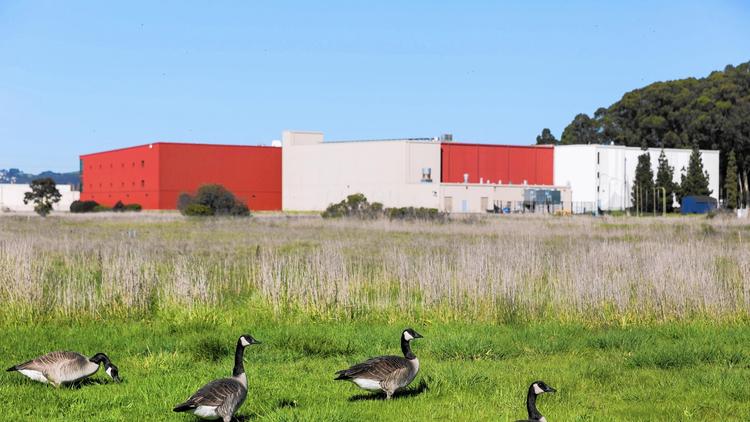
Geese wander outside one of the facilities at the Richmond Field Station. (Marcus Yam, Los Angeles Times)
By Larry Gordon contact the reporter
UC Berkeley is proposing a global campus where UC and foreign universities would offer joint graduate degrees
On the waterfront seven miles from UC Berkeley, the university owns what is now an isolated and somewhat ramshackle collection of storage facilities and labs. But Berkeley's chancellor envisions it as a future showcase for international education.
The 130-acre property between Interstate 580 and the San Francisco Bay houses, among other things, earthquake research, little-used library books and museum artifacts, an art studio and a lab to test roadway concrete. It is an underpopulated place, with more eucalyptus trees and geese than people and a history of pollution problems.
Yet, the site, known as the Richmond Field Station, has a couple of things that the crowded and landlocked main campus does not. First is the stunning bay view, with San Francisco's skyscrapers and the San Francisco-Oakland Bay Bridge directly beyond marshes. Then, there is the sheer space, enough to increase UC Berkeley's classroom and office capacity by 50%.
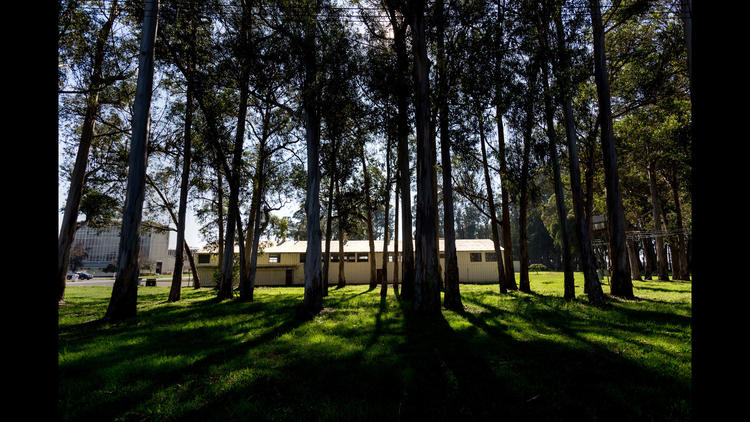
Caption Richmond Field Station
Marcus Yam / Los Angeles Times
An empty building is illuminated by the afternoon sun.
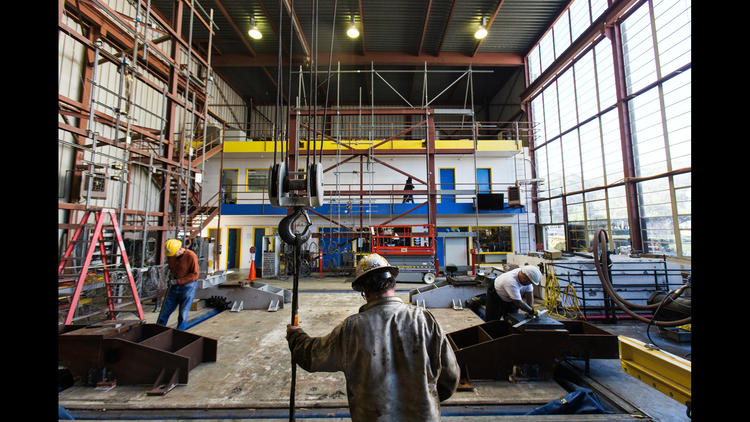
Caption Richmond Field Station
Marcus Yam / Los Angeles Times
Foundations for a power generator plant phase switch is being installed.
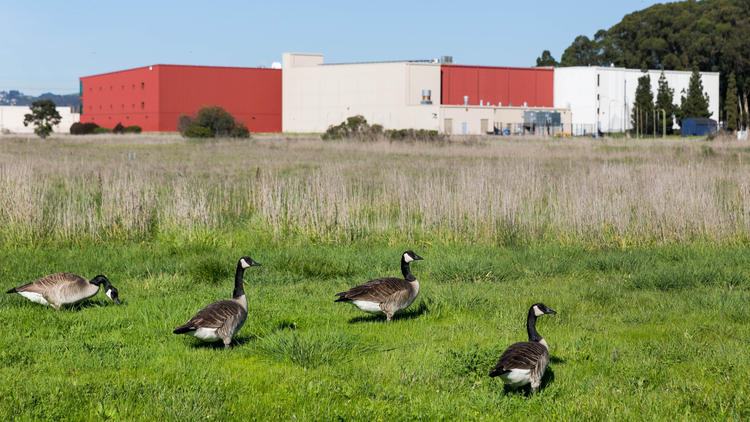
Caption Richmond Field Station
Marcus Yam / Los Angeles Times
Geese wander outside the UC Northern Regional Library Facility.
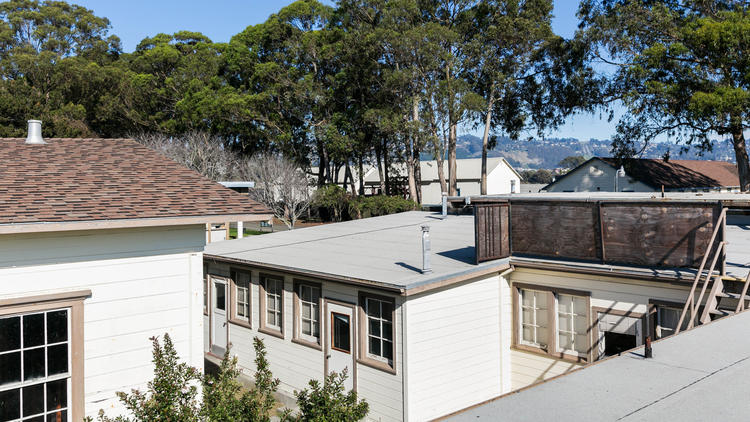
Caption Richmond Field Station
Marcus Yam / Los Angeles Times
Old buildings, slated for demolition sit unoccupied at UC Berkeley's Richmond Field Station.
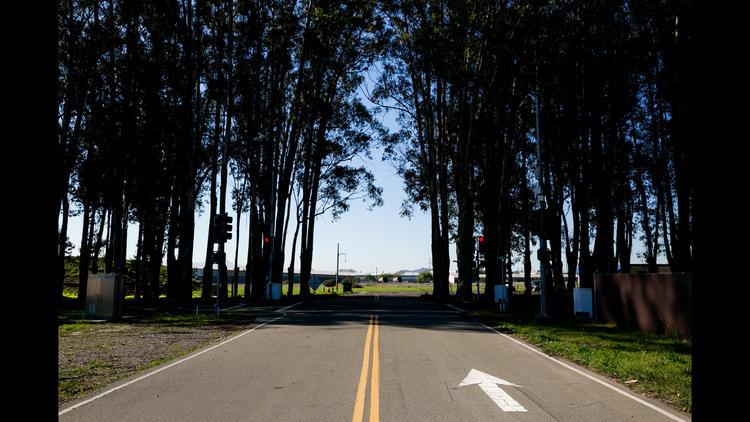
Caption Richmond Field Station
Marcus Yam / Los Angeles Times
An empty road that is often used for experiments.
UC Berkeley Chancellor Nicholas Dirks is promoting an ambitious and unorthodox proposal that taps the Richmond Field Station's assets and adds an international twist. Dirks is suggesting a 40-year plan to create what he calls the UC Berkeley Global Campus at Richmond Bay.
He envisions a satellite campus where UC and foreign universities would offer joint graduate degrees and as many as 10,000 students and faculty from overseas and California would conduct interdisciplinary research on climate change, world health, big data and urban studies.
"We could do something extraordinary here," Dirks said. Citing proximity to Silicon Valley, he said the region's reputation for innovation "could exercise a very powerful draw for potential partners both here and abroad."
His proposal, he said, would give UC Berkeley "a greater global footprint" without actually going overseas and provide foreign schools a West Coast outpost.
Conceptually, the plan fits into one trend in American academia and is the flip side of another.
Several schools have constructed substantial satellite campuses in the same city or state as their traditional home. Columbia University in New York, where Dirks was provost before coming to Berkeley, is building a campus a few blocks north of its main property for health science, business and arts programs. Cornell University in upstate New York is collaborating with an Israeli university on a new scientific campus on Roosevelt Island off Manhattan. And, UC San Francisco over the last decade has created its Mission Bay campus, a large medical and health research facility on former rail yards across town from its older campus.
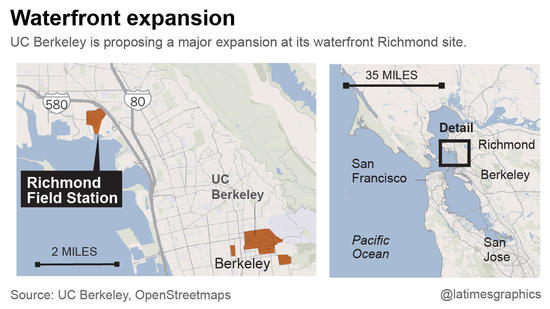
In the international realm, Berkeley's proposal is an alternative to the establishment of campuses overseas by other schools, including NYU in Abu Dhabi and Shanghai, Duke in Kunshan, China, and Texas A&M in Qatar. Some U.S. campuses overseas are successful, but others faced cost overruns, disappointing enrollments and restrictions on academic freedom.
Allan E. Goodman, president of the Institute of International Education, which helps administer the Fulbright Fellowships and other programs, said that the trend of American colleges building overseas is cooling down and that UC Berkeley's idea may appeal to international schools.
"This is a very attractive part of our country and ... UC Berkeley is a global brand," Goodman said.
SUNY Albany professor Jason Lane, who researches international education, said Dirks' plan would be the first of its kind in having multiple global partners on a U.S. campus.
"It's a different spin in international education," he said. As a result, it faces uncertainties about financing, curricula and relationships among the schools, he said.
cComments
- According to a recent survey, 37 percent of the British students said they were considering overseas study. For 32 percent of students in the United States, cost was the greatest nonacademic barrier to study abroad, the survey found. Among British respondents who were interested in studying...
UC officials acknowledge that the proposal faces many hurdles, especially in undetermined funding that could reach into the billions. Officials say that UC money would not be used and that philanthropy, partnerships with international schools and corporations are likely sources.
Dirks has pitched the idea to overseas universities during trips abroad, including recently at the World Economic Forum in Davos, Switzerland. His staff says that some announcements about partnerships are expected in the spring and that some programs could get underway in 2017; they declined to release specifics.
Previous plans for the site collapsed amid funding problems and concerns about pollution remaining from a long-departed blasting caps and explosives factory there.
Three years ago, the Lawrence Berkeley National Laboratory, a federally funded and UC-administered energy center, proposed making the Richmond property its second campus. But federal funding dried up, and Dirks said he went "back to the drawing board" and switched to the Global Campus idea. UC regents last spring approved a long-range plan that can accommodate either.
Locally, the plan seeks to extend the regional building boom to the more gritty Richmond. That city of about 110,000 has significantly higher poverty and crime rates than its neighbors and a reputation for pollution reinforced by the massive August 2012 fire at its Chevron refinery. Its once vibrant waterfront has empty and underutilized land, some of it awaiting toxic cleanups.
Richmond City Manager Bill Lindsay sees the UC proposal as "a catalyst for other good things happening in Richmond." And city officials are touting a planned ferry route to San Francisco, with a dock a mile from the UC site.
Although UC land is exempt from property tax, a new campus could encourage taxable commercial and housing developments on adjacent lots and provide jobs, he said. And it would bring emotional change: UC Berkeley faculty may come to consider Richmond "their second home" and Richmond residents may see UC as "their university too," Lindsay said.
The property, which UC bought in 1950, is now isolated by the freeway, and "a lot of people don't even know about it," he said.
A study by UC Berkeley's Haas Institute for a Fair and Inclusive Society and community groups detailed economic benefits to Richmond but also raised concerns about displacement of lower-income, mainly black and Latino residents by gentrification.
"The question is: Will it be done in a way that doesn't benefit the community and isolates the community or in a way that benefits the community and integrates the community and the university?" said institute Director John Powell, a UC professor of law and ethnic studies.
On a recent tour, the Richmond station felt like a sleepy military base. Only about 300 people work there in bungalows, warehouses and labs, and research debris like metal beams from quake testing is piled up outdoors. Large swaths of marshlands, tree groves and open space will remain preserved after all the proposed construction and the final stages of removing mercury and other toxic pollutants lingering in the soil, according to the project's development manager, Terezia Nemeth.
She acknowledged that it might be hard to envision the Global Campus. So part of her job, she said, is to show models and artists' renderings that portray such a transformation and to explain how the future campus could be a boon to Richmond and add to the intellectual life at UC Berkeley.
larry.gordon@latimes.com
Twitter: @larrygordonlat
Want to receive TOM BUTT E-FORUM and other action alerts on Richmond political and community issues delivered to your email address? Email your name and email address and/or the names and email addresses of others who would like to be placed on the mailing list and the message "subscribe" to tom.butt@intres.com. Comments, arguments and corrections are welcome. Tom Butt is a member of the Richmond City Council when opinions and views expressed, without other attribution, in TOM BUTT E-FORUM, they are those of Tom Butt and do not reflect official views or positions of the City of Richmond or the Richmond City Council unless otherwise noted. Visit the Tom Butt website for additional information about Tom Butt's activities on the Richmond City Council: http://www.tombutt.com. Phone 510/236-7435 or 510/237-2084. Subscription to this service is at the personal discretion of the recipient and may be terminated by responding with “unsubscribe.” It may take a few days to remove addresses from the distribution list.
This site may contain copyrighted material the use of which has not always been specifically authorized by the copyright owner. We are making such material available in our efforts to advance understanding of environmental, political, human rights, economic, democracy, scientific, and social justice issues, etc. We believe this constitutes a 'fair use' of any such copyrighted material as provided for in section 107 of the US Copyright Law. In accordance with Title 17 U.S.C. Section 107, the material on this site is distributed without profit to those who have expressed a prior interest in receiving the included information for research and educational purposes. For more information go to: http://www.law.cornell.edu/uscode/17/107.shtml. If you wish to use copyrighted material from this site for purposes of your own that go beyond 'fair use', you must obtain permission from the copyright owner.
To the extent that content is excerpted under the fair use doctrine from other media, I urge readers to subscribe to the print versions of these media to help support professional journalism and the businesses that publish news, and I urge readers to log in to the online versions to access additional content, related content and unrelated news. I especially appreciate local sources of news that include the Contra Costa Times , the San Francisco Chronicle, Richmond Confidential and the East Bay Express.
|
|

